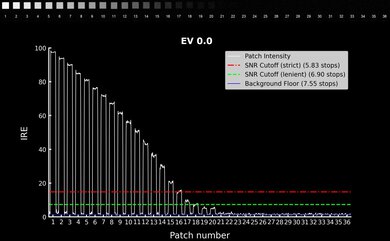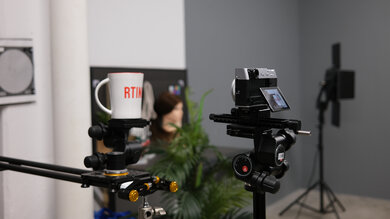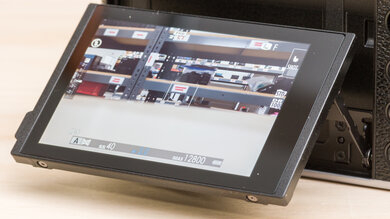
Street photography is an art that requires a good eye, a little discretion, and a camera that you can take anywhere. The saying goes that the best camera is the one you have on you, but while your smartphone can capture interesting moments in a pinch, a dedicated camera can take your street photos to the next level. A good street photography camera has to be lightweight and portable, with easy-to-adjust settings, a relatively fast lens, and effective autofocus to capture fleeting moments.
For those reasons, we've geared our list toward compact cameras. Depending on your needs and preferences, however, an interchangeable-lens mirrorless camera can also fit the bill, especially when paired with a small prime lens. To that end, we've also included some of the best mirrorless options, which you can find listed beneath our point-and-shoot picks.
We've bought and tested over 110 cameras in our lab, and below, you'll find our top-tested cameras for street photography. If you're interested in urban landscape photography, you might also want to check out our picks for the best cameras for landscape photography. Or, if you want to take street photos while traveling abroad, you can check out our recommendations for the best travel cameras or the best compact cameras.
-
Best Compact Camera For Street Photography
Travel Photography7.3Landscape Photography8.4Sport & Wildlife Photography6.0Vlogging3.9Studio Video3.5Action Video3.8Performance Usages: Raw Photo8.8The RICOH GR III is by far one of the best cameras for street photography on the market. Its minimalist design isn't the sexiest, but you can't beat its tiny, unassuming form factor for discretion and portability. Miraculously, given how compact it is, it also features a relatively large APS-C sensor and built-in stabilization, so it captures excellent overall image quality, with great low-light performance to boot, thanks to its wide-aperture lens. Of course, that tiny design means no viewfinder or even a tilting screen, so there are some trade-offs.
While the GR III doesn't have the fastest or most reliable autofocus, it comes with a unique 'Snap Focus' feature that's ideal for street shooting. With the press of a button, the camera 'snaps' the focus to a pre-set distance, which is incredibly convenient for quick, discreet shots when you can gauge your distance to a subject. The wide-angle 28mm full-frame equivalent focal length is also well-suited to street scenes, giving you a lot of coverage and room to crop in if needed. If you prefer a slightly narrower field of view, you can opt for the RICOH GR IIIx instead; it's a tad pricier but comes with a 40mm equivalent lens that gives you a more natural field of view.
-
Best Premium Compact Camera For Street Photography
Travel Photography7.8Landscape Photography7.8Sport & Wildlife Photography7.7Vlogging6.4Studio Video7.9Action Video6.0Performance Usages: Raw Photo7.9The Fujifilm X100VI isn't nearly as small or discreet as the RICOH GR III, but it offers a lot more functionality and premium features that you won't find on any other point-and-shoot. Like the RICOH, it uses a larger APS-C sensor but with a much higher 40.2-megapixel resolution that gives you more leeway to crop your images. Its dynamic range is excellent, and it has a notably more reliable AF system. Plus, its unique hybrid viewfinder can toggle between an electronic viewfinder and an optical rangefinder with frame lines to give you a wider view of your subject's surroundings. The tilting screen is also great for waist-level shooting. All of that, plus a fantastic built-in lens with a 35mm equivalent focal length, make it one of the best cameras for street photography.
That being said, this is an expensive camera—it's pricier than many interchangeable lens models. Popular demand has also made it hard to find in stock. If you don't think the X100VI is worth the hype, you might be all set with another camera from our list. Alternatively, if you like the size of the X100VI and want the Fuji shooting experience, picking up the older Fujifilm X-E4 and pairing it with a small prime lens comes pretty close, though it uses a lower-resolution sensor and lacks the X100VI's optical rangefinder.
-
Best Compact Zoom Camera For Street Photography
Travel Photography7.3Landscape Photography6.9Sport & Wildlife Photography7.2Vlogging7.2Studio Video6.5Action Video5.2Performance Usages: Raw Photo6.3If you'd prefer a compact camera with a bit of zoom range, the Sony RX100 VII is the best camera for street photography with a built-in zoom lens. It's similar in size to the RICOH GR III, though it uses a smaller 1-inch type sensor, making it less suited to low-light shooting. Despite that, it's still a great sensor for its size, with a stacked design that allows for incredibly quick 20 fps burst shooting. Beyond that, its built-in lens has a versatile 24-200mm equivalent focal length range, giving you more flexibility to shoot subjects that are farther away.
Despite its compact design, the camera also comes with useful extras like a pop-up viewfinder, which is nice to have on sunny days, and a tilting screen that's great for waist-level shots. Physical controls are somewhat limited, so if you'd prefer a more old-school feel with manual exposure dials, the Panasonic LUMIX LX100 II is a great alternative if you can find it. However, it's been discontinued and has a shorter zoom range than the Sony.
-
Best Mirrorless Camera For Street Photography
Travel Photography8.2Landscape Photography8.1Sport & Wildlife Photography8.3Vlogging7.5Studio Video8.9Action Video6.9Performance Usages: Raw Photo8.1While you can't beat compact cameras for portability, an interchangeable lens camera gives you more versatility. The Fujifilm X-T5 is one of the best street photography cameras with an interchangeable lens design. It has old-school exposure dials that make it easy to adjust your settings on the go, and it brings back the three-way tilting screen from older models in the X-T series, so you can easily capture shots from almost any angle. The camera is also relatively compact and has an excellent battery life for a mirrorless model.
The X-T5's 40.2-megapixel sensor is the highest-resolution APS-C sensor on the market, capturing a greater level of fine detail and giving you more flexibility to crop your images, which comes in handy if you prefer to shoot from farther away. If you're more of a photography "purist," you might enjoy the design of the Fujifilm X-Pro3, which is a great alternative to the X-T5. It uses an older-generation sensor with a lower resolution, but its hybrid viewfinder and reverse-tilting screen are meant to encourage more engagement with your surroundings, which is a big plus for street photography.
-
Best Budget Mirrorless Camera For Street Photography
Travel Photography7.6Landscape Photography7.6Sport & Wildlife Photography7.4Vlogging7.3Studio Video6.9Action Video4.7Performance Usages: Raw Photo7.4Last but not least is the Olympus OM-D E-M10 Mark IV, one of the best budget mirrorless cameras we've tested. It uses a Micro Four Thirds sensor, so you won't get as much dynamic range or fine detail as you do with the high-resolution APS-C sensor on the Fujifilm X-T5. But the upside of that smaller sensor is that it's a much more portable camera system with smaller lenses that make for a highly portable kit.
It's also one of the few cameras at this price point to feature in-body image stabilization, making it easier to get clear handheld shots at slower shutter speeds. The ergonomics are also great for such a small camera. However, it doesn't have the most reliable autofocus system, and its build quality isn't as good as more expensive models. Still, if you're looking for a compact camera system that won't cost you a fortune, the E-M10 Mark IV is a great choice.
Notable Mentions
- Fujifilm X-T30 II: The Fujifilm X-T30 II is a very portable mirrorless option. It's a bit pricier than the Olympus OM-D E-M10 Mark IV and uses an APS-C sensor, but it doesn't have IBIS. See our review
- Fujifilm X-T50:
The Fujifilm X-T50 is the successor to the Fujifilm X-T30 II and feels like a compact version of the Fujifilm X-T5. It's significantly more portable than the X-T5 but still features the same sensor and an IBIS system. However, it has a much shorter battery life and a smaller lower-resolution EVF, and it isn't weather-sealed.
See our review - Sony α7C II: The Sony α7C II is an excellent full-frame mirrorless camera with a relatively compact body. It's a great alternative to the Fujifilm X-T5 if you need a full-frame sensor and a more reliable autofocus system. However, its small viewfinder isn't especially comfortable to shoot with. See our review
- Sony α7C: The Sony α7C is the predecessor to the Sony α7C II mentioned above. It's a great deal now that it's been succeeded, with a still-excellent full-frame sensor and amazing autofocus. However, it has fewer physical control dials than the Fujifilm X-T5. Its small electronic viewfinder can also be uncomfortable to shoot with. See our review
Recent Updates
-
We reviewed the picks to ensure they're still accurate and updated some text for clarity.
-
Sep 25, 2024 : We added the Fujifilm X100VI as the 'Best Premium Compact Camera For Street Photography' and removed the Fujifilm X100V from the Notable Mentions. We also added the Fujifilm X-T50 as a Notable Mention due to its compact size and feature set.
-
Jun 28, 2024 : We reviewed the picks to ensure we're still recommending the best products for users. We added information in the Notable Mentions section to clarify that we haven't tested the Fujifilm X100VI yet.
-
May 03, 2024 : We removed the Olympus OM-D E-M5 Mark III from the Notable Mentions because it's an older model that's less suited to street photography than the rest of our picks.
-
Mar 07, 2024 : We've moved the Fujifilm X100V to the Notable Mentions, as it's very hard to find in stock and has now been replaced by the Fujifilm X100VI.
All Reviews
Our recommendations above are what we think are currently the top street photography cameras for most people to buy, according to their needs. We factor in the price, feedback from our visitors, and availability (no cameras that are difficult to find or almost out of stock in the U.S.).
If you'd like to choose for yourself, here's the list of all our point-and-shoot and interchangeable lens camera reviews. Be careful not to get caught up in the details. There is no single perfect camera. Personal taste, preference, and shooting habits will matter more in your selection.
Comments
Best Cameras For Street Photography: Main Discussion
What do you think of our picks? Let us know below.
Looking for a personalized buying recommendation from the RTINGS.com experts? Insiders have direct access to buying advice on our insider forum.
Update: We reviewed the picks to ensure they’re still accurate and updated some text for clarity.
What do you think of these changes? Let us know

































































